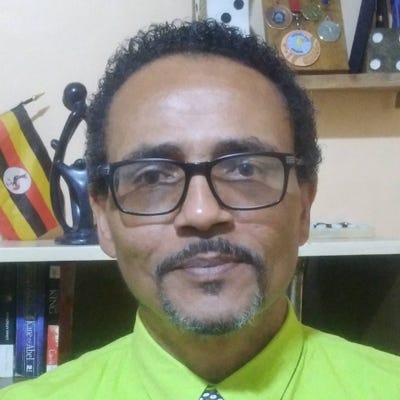Blockchain: Underpinning trust in AfricaBlockchain: Underpinning trust in Africa
ICT analyst Francis Hook explores the evolution of blockchain technology in Africa, highlighting use cases, adoption challenges, and gives an outlook for its continued growth across the continent going forward.
.jpg?width=1280&auto=webp&quality=95&format=jpg&disable=upscale)
Blockchain technology might not enjoy the same public visibility as other emerging technologies like artificial intelligence (AI), cloud computing or the Internet of Things (IoT) but has nonetheless been playing an integral role in building trust in systems that contain or relate to personal and financial information.
Aside from personal and financial information, there is a growing need to offer assurance in supply chains.
Whether it is market produce for which consumers need assurances about origins, handling and storage of produce, or raw materials over whose journey manufacturers and retailers need visibility to ensure adherence to ethical, environmental and other standards.
Blockchain was born more than a decade ago when cryptocurrencies like Bitcoin started becoming mainstream and is largely premised on a ledger system that allows for an immutable process to record transactions and track assets.
This capability is now being used to enhance transparency and integrity of existing systems as well as mitigate different types of fraud, anti-money laundering (AML) and anti-terrorism financing.
Beyond assuring the integrity of financial and other transactions, in instances where anonymity is barred and where traceability is ensured, blockchain can also interrogate transactions to reduce fraud, money laundering and other illegal financial activities (like receiving payments in the form of cryptocurrencies for ransomware attacks) which it ironically has enabled before.
_(1).jpg?width=700&auto=webp&quality=80&disable=upscale)
Blockchain can assure the integrity of financial transactions, reduce fraud, money laundering and other illegal financial activities. (Source: Image by Freepik)
In the public sector, blockchain use cases range from strengthening tax collection methods to voting systems to land registration.
Other areas where use cases are being piloted to enhance service delivery include public sector education (certification and credentials), healthcare (record keeping and data collection integrity) and support for agriculture (farm produce supply chains, government supported farm inputs, produce marketing, etc.).
As a middleware that works with existing systems like supply chain management (SCM), enterprise resource planning (ERP), financial management, core banking and others, blockchain has even more potential to impact processes and enhance data integrity and positively impact security as well.
Common use cases in Africa
In Africa, several sectors are already benefiting from blockchain, including public administration, financial services, manufacturing, retail, healthcare and education.
Some of the more common use cases and the issues it addresses include:
Financial - payment systems (including cross-border payments), loans, mortgages, insurance claims.
Supply chain – tracking raw materials and produce along manufacturing and retail supply chains to gain higher visibility of various issues such as use of pesticides, storage, handling and carbon emissions (during transport, processing, packaging, etc.), ethical and other aspects like human rights.
Document and records management - For example, land registries to eliminate fraud and disputes, patient records in healthcare (to ensure accuracy, currency and privacy of medical records etc.).
Digital identities - to access public services, pensions, social security, enhance digital inclusion and civic participation by enabling trust in systems (e.g. in voting systems to reduce electoral fraud, ensure proper voter identification, strengthen polling systems and accurate vote counting).
Agriculture – ensuring greater fairness in remuneration, introducing pricing transparency and eliminating middlemen from the supply chain.
Conservation and sustainable resource management – for wildlife, minerals, water and land.
Education – tracking academic performance and in line with that, supporting the issuance of credentials (certificates and diplomas).
Legal – smart contracts.
Intellectual property and copyright management.
Adoption drivers
A good example of supply chain management that cuts across different sectors and avails benefits to both businesses and consumers is IBM's Food Trust which is "a collaborative network involving growers, processors, wholesalers, distributors, manufacturers, retailers and others that can enhance visibility and accountability across the food supply chain".
This platform has gained a foothold in markets where consumers, manufacturers and retailers evaluate products not just on price and quality, but additionally their purchases are increasingly being determined by traceability as a key factor in decision making.
Gradually this is something that is picking up in the continent as businesses examine their environment, social and governance (ESG) frameworks, and consumers become more discerning in markets where genetically modified foods or pesticide treated produce are concerns for some.
.jpg?width=700&auto=webp&quality=80&disable=upscale)
Blockchain can be used in agriculture to ensure greater fairness in remuneration, pricing transparency and eliminating middlemen from the supply chain. (Source: Image by Freepik)
For manufacturers and retailers, another dividend from blockchain relates to counterfeit goods and how this sometimes negatively affects brands when quality issues arise.
In addition, along the same supply chain between factories and retail outlets, brand shrinkage is a concern when there is little visibility of products moving between the two.
Aside from business driven needs to adopt blockchain (to reduce fraud, give processes more integrity, stem losses, enhance their ESG frameworks etc.) and more discerning consumer behavior, other drivers for adoption include:
Regulation - compliance with existing laws that relate to data protection and privacy, AML, Know Your Customer (KYC) and compliance with ever evolving taxation regimes.
Digital economy - where there is need to have visibility over unseen transactions, assets and deliverables e.g. advertisements, payments completed online and paid via digital means, and trade in cryptocurrencies (especially where these intersect with or involve fiat money through banks or across borders).
Digital transformation - increased digitization of documents e.g. judiciary, healthcare, education, public administration, insurance, banking, as well as smart contracts and purchase orders.
Hurdles facing blockchain
When it comes to challenges, those facing blockchain are similar to other types of technology adoption.
Infrastructure, power supply and connectivity – this would rank among the key enablers of a decentralized system like blockchain. Countries like South Africa, Nigeria and Kenya have been plagued by serious power outages, either stemming from low capacity or unstable power grids.
Rural connectivity – in remote areas where connectivity is an issue, this hinders the extent to which some systems can be access (e.g. in agriculture).
Legacy systems – replacing or reconfiguring hardware and software systems to work with middleware like blockchain.
Regulatory environment – nascent policies and regulations are emerging across the continent that seek to regulate rather than enable blockchain, and most of these are premised on the genesis of blockchain and cryptocurrencies.
Legal - in some instances, the adoption of blockchain is actually hampered by the absence of any articulated legal framework e.g. data protection, cyber security, legal recognition of smart contracts and purchase orders and other instruments (e.g. drivers licenses, motor vehicle registration, land ownership).
Skills – the ever-present specter that looms on the evolving ICT landscape. This affects the public sector more as allocation of resources, including skills and capacity development, is more focused on actual delivery of government services.
Evolution and outlook
As more businesses and governments undergo digital transformation, the background technological evolution is also having an impact on how existing technologies are being used, and which invariably deepen the extent to which blockchain is currently used.
Some key technologies that are impacting existing ICT systems, and which will also have bearing on the evolution of blockchain, include:
AI - including machine learning, generative AI (querying systems, assessing loan applications, processing insurance claims, detecting fraud).
Cybersecurity - identity management and traffic monitoring.
Mobile - digital identities and payment systems (for banking, social security, retail purchases).
IoT - where devices contribute tracking information to supply chains or monitor the status of assets.
Key public infrastructure - which is sometimes seen as an alternative to blockchain when it comes to how transactions are managed, can be augmented by blockchain systems.
Outside of the impact of emerging technology and ongoing digital transformation, blockchain is expected to scale up and spread out.
For example, under the pan-African aspirations of the African Continental Free Trade Area (AfCFTA), one of the key enablers of this vision is cross border payments and the free movement of goods, both of which are areas where blockchain is delivering good dividends at a country level.
In recent years, decentralized autonomous organizations have been emerging with many of them premised on finance-related businesses like personal investment (and using cryptocurrencies).
This model can help evolve existing micro finance organizations like savings and credit cooperatives as well as become a model for startups in the micro-lending space.
With requisite political will, blockchain will not only enhance government service delivery, ensure transparency and prudent use of resources, but its tamper-resistant nature can continue to lend in a big way to democracy in elections, referendums and other public participation mechanisms.


_(1)_(1).jpg?width=700&auto=webp&quality=80&disable=upscale)
.jpg?width=700&auto=webp&quality=80&disable=upscale)
_(1).jpg?width=700&auto=webp&quality=80&disable=upscale)

.jpg?width=700&auto=webp&quality=80&disable=upscale)
.jpg?width=700&auto=webp&quality=80&disable=upscale)
_(1).jpg?width=700&auto=webp&quality=80&disable=upscale)
.jpg?width=700&auto=webp&quality=80&disable=upscale)

.jpg?width=700&auto=webp&quality=80&disable=upscale)